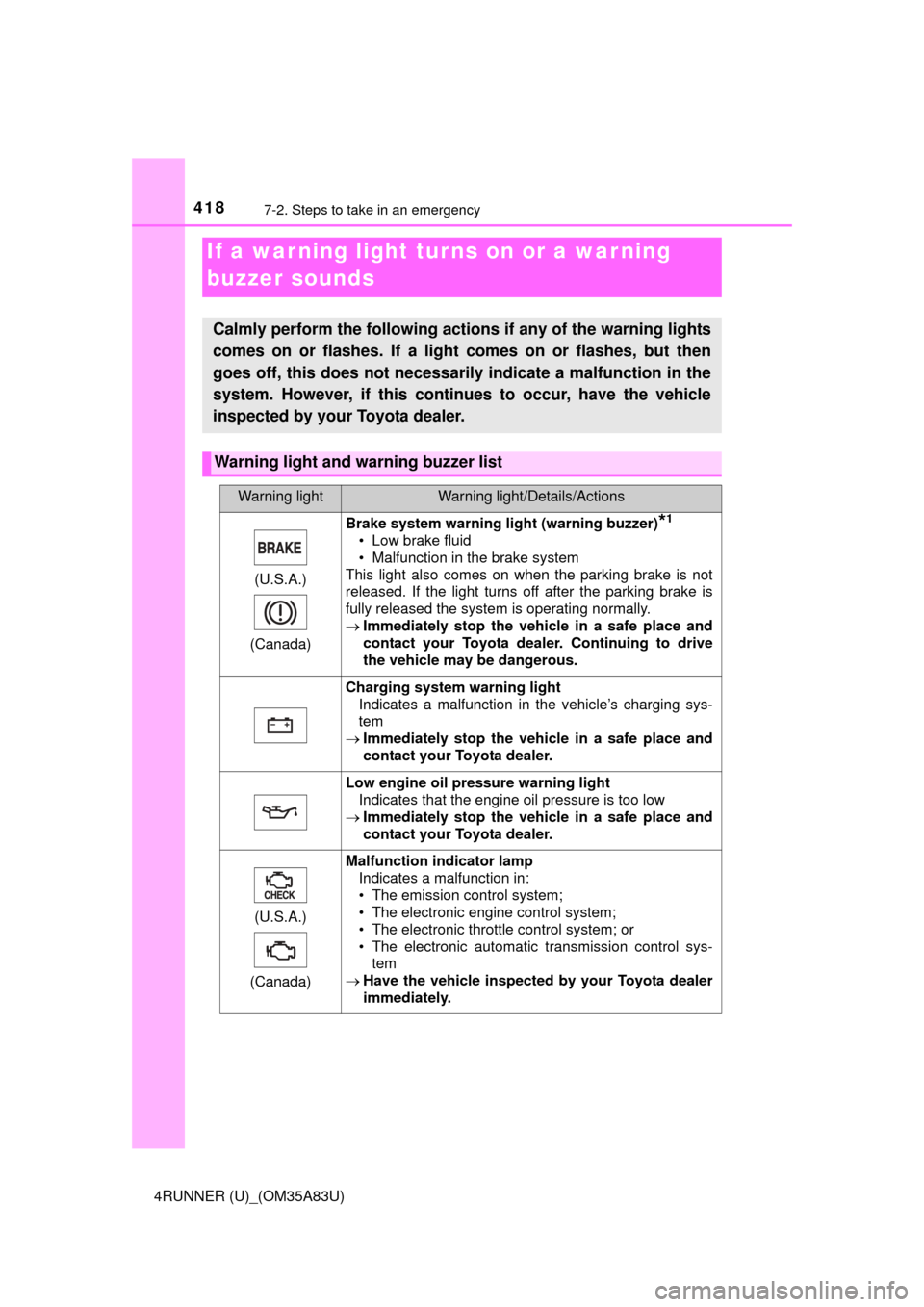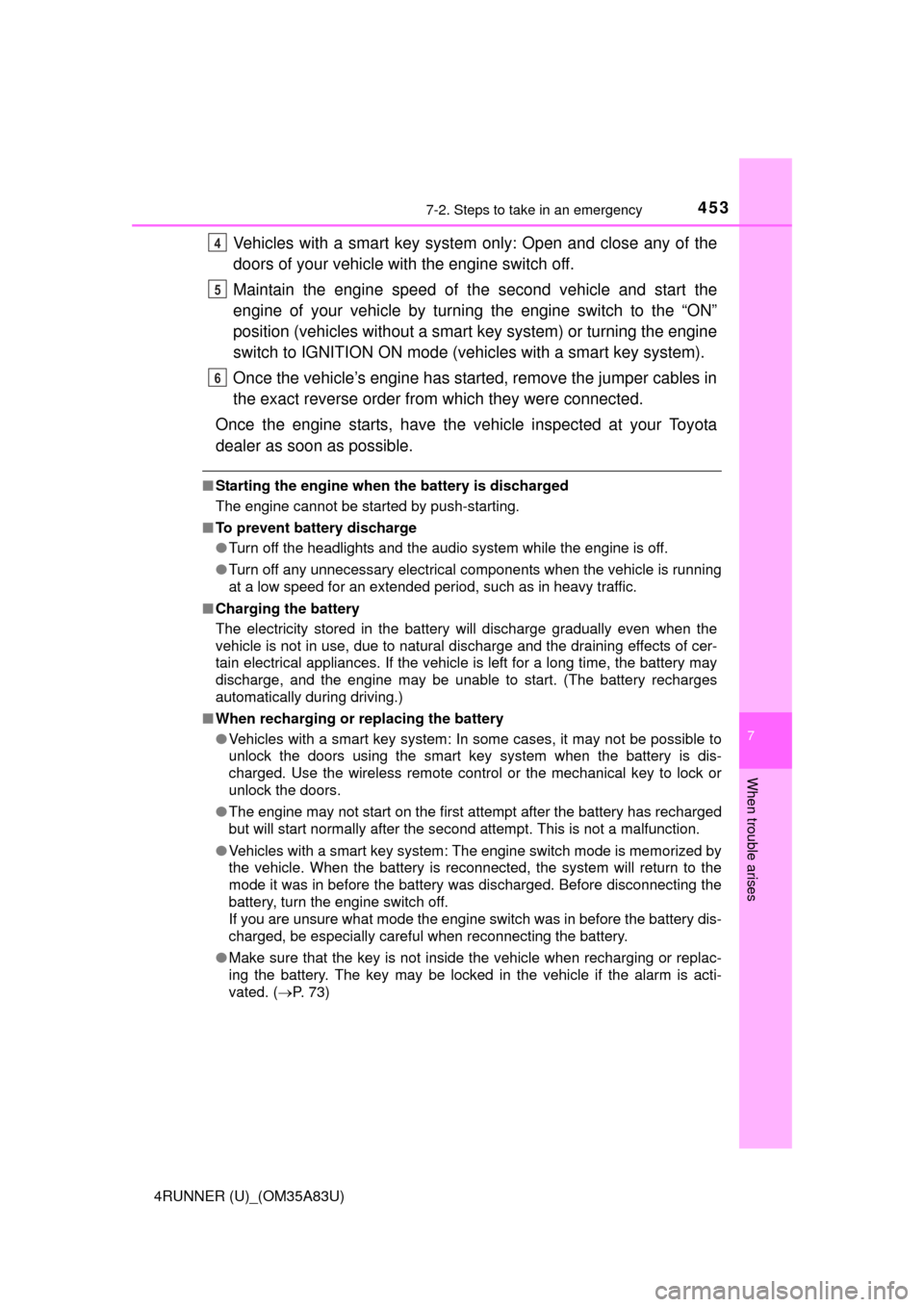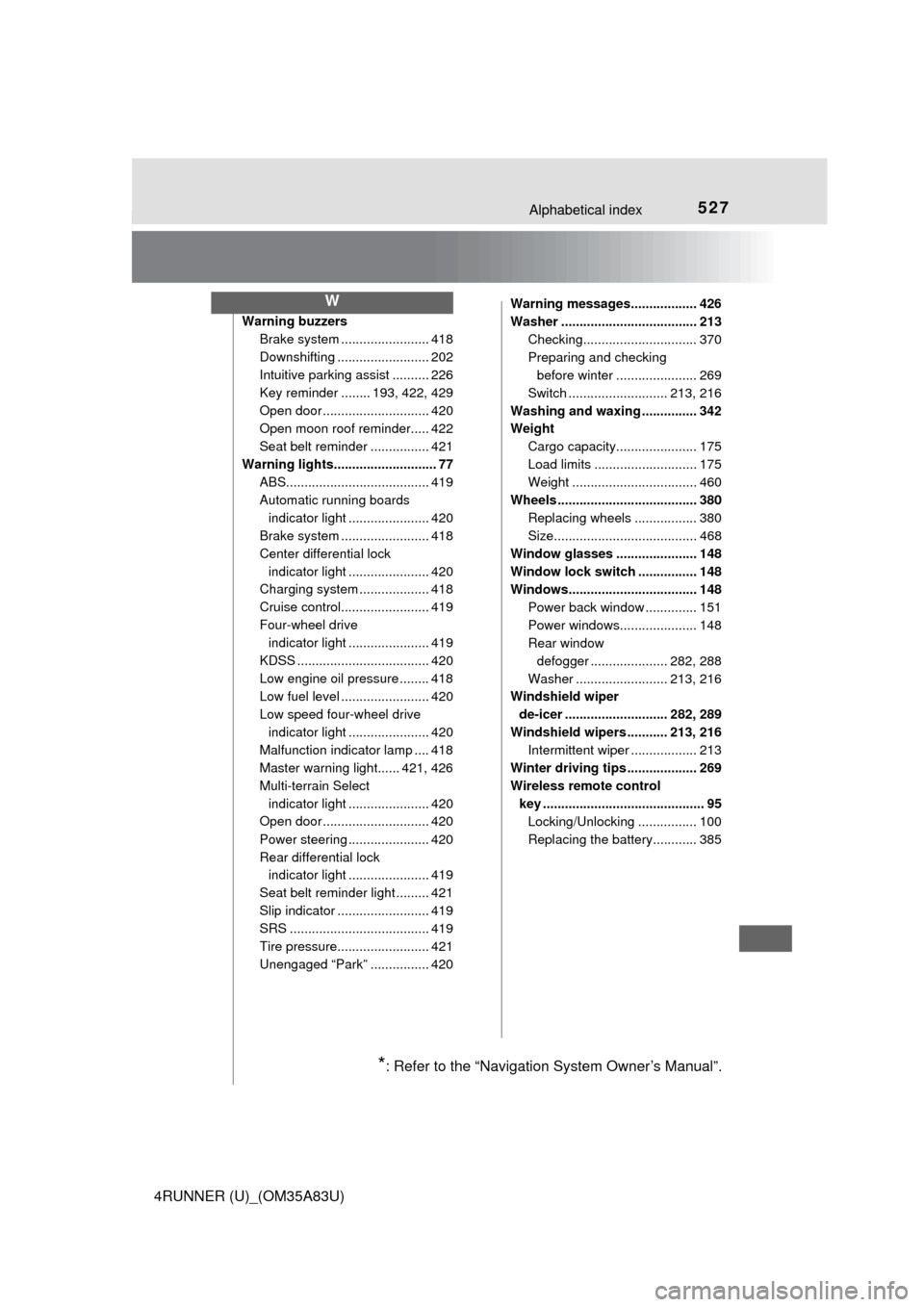Page 420 of 530

4187-2. Steps to take in an emergency
4RUNNER (U)_(OM35A83U)
If a warning light turns on or a warning
buzzer sounds
Calmly perform the following actions if any of the warning lights
comes on or flashes. If a light comes on or flashes, but then
goes off, this does not necessarily indicate a malfunction in the
system. However, if this continues to occur, have the vehicle
inspected by your Toyota dealer.
Warning light and warning buzzer list
Warning lightWarning light/Details/Actions
(U.S.A.)
(Canada)
Brake system warning light (warning buzzer)*1
• Low brake fluid
• Malfunction in the brake system
This light also comes on when the parking brake is not
released. If the light turns off after the parking brake is
fully released the system is operating normally.
Immediately stop the vehicle in a safe place and
contact your Toyota dealer. Continuing to drive
the vehicle may be dangerous.
Charging system warning light
Indicates a malfunction in the vehicle’s charging sys-
tem
Immediately stop the vehicle in a safe place and
contact your Toyota dealer.
Low engine oil pressure warning light
Indicates that the engine oil pressure is too low
Immediately stop the vehicle in a safe place and
contact your Toyota dealer.
(U.S.A.)
(Canada)
Malfunction indicator lamp Indicates a malfunction in:
• The emission control system;
• The electronic engine control system;
• The electronic throttle control system; or
• The electronic automatic transmission control sys-tem
Have the vehicle inspected by your Toyota dealer
immediately.
Page 455 of 530

4537-2. Steps to take in an emergency
7
When trouble arises
4RUNNER (U)_(OM35A83U)
Vehicles with a smart key system only: Open and close any of the
doors of your vehicle with the engine switch off.
Maintain the engine speed of the second vehicle and start the
engine of your vehicle by turni ng the engine switch to the “ON”
position (vehicles without a smart key system) or turning the engine
switch to IGNITION ON mode (v ehicles with a smart key system).
Once the vehicle’s engine has started, remove the jumper cables in
the exact reverse order from which they were connected.
Once the engine starts, have the vehicle inspected at your Toyota
dealer as soon as possible.
■ Starting the engine when the battery is discharged
The engine cannot be started by push-starting.
■ To prevent battery discharge
●Turn off the headlights and the audio system while the engine is off.
● Turn off any unnecessary electrical components when the vehicle is running
at a low speed for an extended period, such as in heavy traffic.
■ Charging the battery
The electricity stored in the battery will discharge gradually even when the
vehicle is not in use, due to natural discharge and the draining effects of cer-
tain electrical appliances. If the vehicle is left for a long time, the battery may
discharge, and the engine may be unable to start. (The battery recharges
automatically during driving.)
■ When recharging or replacing the battery
●Vehicles with a smart key system: In some cases, it may not be possible to
unlock the doors using the smart key system when the battery is dis-
charged. Use the wireless remote control or the mechanical key to lock or
unlock the doors.
● The engine may not start on the first attempt after the battery has recharged
but will start normally after the second attempt. This is not a malfunction.
● Vehicles with a smart key system: The engine switch mode is memorized by
the vehicle. When the battery is reconnected, the system will return to the
mode it was in before the battery was discharged. Before disconnecting the
battery, turn the engine switch off.
If you are unsure what mode the engine switch was in before the battery dis-
charged, be especially careful when reconnecting the battery.
● Make sure that the key is not inside the vehicle when recharging or replac-
ing the battery. The key may be locked in the vehicle if the alarm is acti-
vated. ( P. 73)
4
5
6
Page 467 of 530
4658-1. Specifications
8
Vehicle specifications
4RUNNER (U)_(OM35A83U)
*: Your Toyota vehicle is filled with “Toyota Genuine Transfer Gear oil LF” atthe factory. Use Toyota approved “Toyota Genuine Transfer Gear oil LF” or
an equivalent of matching quality to satisfy the above specification. Pl\
ease
contact your Toyota dealer for further details.
Electrical system
Battery
Open voltage* at
68 F (20 C):
12.6 12.8 V Fully charged
12.2 12.4 V Half charged
11 . 8 12.0 V Discharged
(
*: Voltage checked 20 minutes after the
engine and all the lights are turned off.)
Charging rates5 A max.
Transfer (4WD models)
Oil capacity
Part-time 4WD models
1.1 qt. (1.0 L, 0.9 Imp. qt.)
Full-time 4WD models
1.5 qt. (1.4 L, 1.2 Imp. qt.)
Oil type*Toyota Genuine Transfer gear oil LF or
equivalent
Recommended oil viscositySAE 75W
Page 529 of 530

527Alphabetical index
4RUNNER (U)_(OM35A83U)
Warning buzzersBrake system ....... ................. 418
Downshifting ......................... 202
Intuitive parking assist .......... 226
Key reminder ........ 193, 422, 429
Open door ............................. 420
Open moon roof reminder..... 422
Seat belt reminder ................ 421
Warning lights............................ 77 ABS....................................... 419
Automatic running boards
indicator light ...................... 420
Brake system ....... ................. 418
Center differential lock indicator light ...................... 420
Charging system ................... 418
Cruise control........................ 419
Four-wheel drive indicator light ...................... 419
KDSS .................................... 420
Low engine oil pressure ........ 418
Low fuel level ........................ 420
Low speed four-wheel drive indicator light ...................... 420
Malfunction indicator lamp .... 418
Master warning light...... 421, 426
Multi-terrain Select indicator light ...................... 420
Open door ............................. 420
Power steering ...................... 420
Rear differential lock indicator light ...................... 419
Seat belt reminder light ......... 421
Slip indicator ......................... 419
SRS ...................................... 419
Tire pressure......................... 421
Unengaged “Park” ................ 420 Warning messages.................. 426
Washer ..................................... 213
Checking............................... 370
Preparing and checking before winter ...................... 269
Switch ........................... 213, 216
Washing and waxing ............... 342
Weight Cargo capacity...................... 175
Load limits ............................ 175
Weight .................................. 460
Wheels ...................................... 380 Replacing wheels ................. 380
Size....................................... 468
Window glasses ...................... 148
Window lock switch ................ 148
Windows................................... 148 Power back window .............. 151
Power windows..................... 148
Rear window defogger ..................... 282, 288
Washer ......................... 213, 216
Windshield wiper
de-icer ............................ 282, 289
Windshield wipers ........... 213, 216 Intermittent wiper .................. 213
Winter driving tips ................... 269
Wireless remote control
key ............................................ 95 Locking/Unlocking ................ 100
Replacing the battery............ 385
W
*: Refer to the “Navigation System Owner’s Manual”.